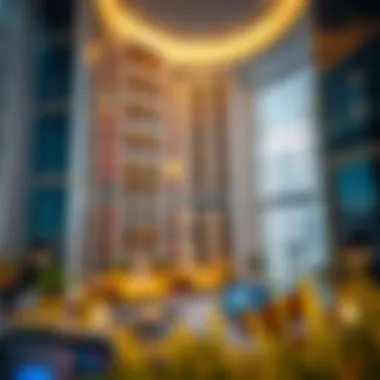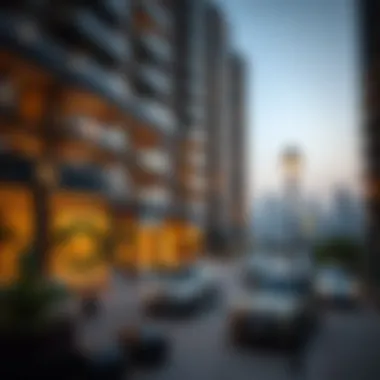Current Trends in Dubai Apartment Prices 2023


Intro
Dubai’s real estate landscape is a topic that captures the attention of investors, buyers, and renters alike. The continuously evolving market is not just about extravagant skyscrapers or lavish lifestyles; it reflects broader economic trends and cultural shifts. Recent statistics and anecdotal evidence hint at fascinating fluctuations in apartment prices across various neighborhoods. Understanding these trends is essential for making well-informed decisions in the property market.
As one navigates through Dubai’s apartment price landscape, several factors come into play. From the impact of foreign investment to shifting demographics, these influences create a dynamic environment for potential inhabitants and investors. This article aims to unpack the current trends in average apartment prices, offering insights into the market's present state and what lies ahead. Readers will explore neighborhood comparisons, the types of properties available, and essential details relevant particularly for those eyeing investment opportunities in Dubai.
Equipped with this knowledge, stakeholders can steer confidently through the complexities of the market, ensuring they are not just participants but informed strategists in this bustling real estate arena.
Market Trends
Current Market Analysis
Presently, the apartment market in Dubai exhibits a mixed bag of characteristics. Prices have shown signs of stabilization after a period of fluctuating costs, driven by various external and internal factors. Neighborhoods such as Dubai Marina and Downtown Dubai continue to command high prices, often attributed to their premium location and amenities. Conversely, areas like Jumeirah Village Circle (JVC) present opportunities for value-seeking buyers, offering competitive prices for conditionally good properties.
Several factors contribute to this price variation:
- Location: Proximity to major business districts and leisure facilities significantly impacts pricing.
- Market Sentiment: A general optimism surrounding economic recovery boosts buyer confidence.
- Supply and Demand: While there is strong demand, the pace of new construction can sometimes outstrip buyers, leading to adjustments in pricing.
To illustrate these trends further:
"Average apartment prices in Dubai have leveled out, shifting from steep declines to more moderate fluctuations, offering a glimmer of hope for prospective homeowners and investors."
Future Predictions
As we look to the future, several predictions can be made regarding the pricing trends in Dubai's apartment market. Economic indicators suggest a cautiously optimistic outlook, with a potential steady climb in prices due to increasing foreign investments and the expected influx of expatriates.
- Post-Pandemic Recovery: As the world continues to recover from health crises, Dubai's unique position as a global business hub could drive interest.
- Sustainability Initiatives: With a growing emphasis on sustainability, properties that incorporate eco-friendly features might see elevated prices.
- Technological Integration: Smart apartments are likely to become more popular, potentially impacting market value.
This forward-looking perspective can help investors make strategic decisions and identify areas poised for growth.
Property Types
Residential Properties
In the realm of residential properties, the diversity found in Dubai’s offerings is noteworthy. From modern high-rises to more traditional villa-style dwellings, the choices are abundant:
- High-rise Apartments: Typically found in urban centers, these cater to a vibrant lifestyle and also present great rental opportunities.
- Villas: Often located in family-oriented communities, providing more space and privacy, which tends to attract higher-income families from diverse backgrounds.
Each property type has its own merits depending on what buyers or renters prioritize, be it luxury, space, or investment potential.
Commercial Properties
On the commercial front, it's essential to recognize that the landscape is just as dynamic. Office spaces, retail establishments, and mixed-use developments are taking on new configurations in response to market demands. The rise of coworking spaces is particularly relevant in the current context:
- Flexible Workspaces: As remote work trends continue, converting traditional office spaces into flexible work settings is an emerging trend.
- Retail Spaces: With e-commerce growing, strategizing locations to attract foot traffic becomes vital for retail properties.
In both residential and commercial property types, understanding the varying needs of different sectors within the market is critical to making sound investments.
This comprehensive understanding of current and potential trends provides the leverage needed for stakeholders in Dubai's real estate market. For further detailed statistics or assistance, you can explore links like Dubai Land Department or Numbeo’s Cost of Living in Dubai.
By keeping an eye on these developments and aligning with broader economic indicators, stakeholders can make calculated moves in this thriving market.
Understanding the Dubai Real Estate Market
The Dubai real estate market stands out as a vibrant and dynamic ecosystem, woven from numerous threads of cultural diversity, economic progress, and rapid development. To grasp the current situation regarding apartment prices in the city, it's vital to first contextualize it within the historical evolution and current dynamics that shape market trends.
Understanding this market is more than just knowing prices; it opens doors to the broader implications of economic cycles, investor confidence, and demographic changes. The value of property goes beyond mere square footage; it encapsulates the potential for growth and the shifting demands of a multicultural populace.
Historical Perspective
Historically, the Dubai real estate market has been characterized by periods of explosive growth followed by corrections. After the establishment of the UAE in the early 1970s, the real estate landscape began to modernize, with significant investments in infrastructure and tourism. The early 2000s saw a surge in demand as expatriates flocked to the city, fueled by the government’s policies aimed at attracting foreign investment. Rapid developments such as the Burj Khalifa and Palm Jumeirah marked a new era, pushing property prices to unprecedented levels.
However, as the global financial crisis hit in 2008, the Dubai real estate sector took a significant hit, leading to a sharp decline in prices. Lessons learned during this tumultuous phase informed policies and regulations that helped stabilize the market in subsequent years.
"Understanding historical trends is crucial. It helps buyers and investors anticipate future market movements and make informed decisions."
Current Market Dynamics
Today, the Dubai real estate market exhibits unique characteristics shaped by local and international factors. The ongoing recovery from the pandemic has instigated renewed interest in investment opportunities, especially in residential apartments. Key trends include:
- Expanding Demand: There is a noticeable increase in demand for luxury apartments, particularly as global travel resumes and the Dubai lifestyle appeals more than ever. The recent World Expo 2020 has also helped boost the city’s visibility, bringing more potential buyers and investors into the picture.
- Price Stabilization: While prices varied dramatically over the past decades, recent statistics indicate a trend towards stabilization, particularly in well-established neighborhoods. This stability is viewed favorably by both local and expat investors.
- Interest Rates Impact: Low interest rates have naturally encouraged more buying activity, even as economic forecasts fluctuate. Buyers are more inclined to purchase property due to the favorable borrowing costs.
- Government Initiatives: Leadership in Dubai has introduced various measures, such as long-term residency visas for investors, further enhancing investor confidence and making the city more attractive to foreign homeowners and renters.
The Dubai real estate market’s characteristics are constantly evolving. Understanding these dynamics equips investors, buyers, and renters with critical insights needed to make informed decisions in a competitive landscape. As one navigates the varying strata of this market, it becomes clear that strategic foresight is paramount.
Average Apartment Prices Overview


Understanding average apartment prices is crucial for anyone engaged in the Dubai real estate scene. Knowing where prices stand not only helps potential buyers make informed decisions but also allows investors to gauge the competitive landscape. Average prices serve as a barometer, reflecting broader economic indicators and market sentiments. When values are high, it indicates strong demand, while a decrease may signify market adjustments or buyer hesitance.
Several factors interconnect to create the mosaic of apartment prices in Dubai. By breaking down current metrics and considering various influences, a clearer picture emerges, enabling renters and landlords alike to strategize effectively. The fluctuating price landscape is not merely numbers; it's influenced by cultural, economic, and even global dynamics.
This article seeks to delve into the current metrics surrounding apartment prices and identify the factors driving the shifts in these figures. Understanding this information is vital for investors looking to capitalize on opportunities, and for homebuyers who want to secure their ideal residence at the best possible price.
Let's take a closer look at the specifics of average pricing in the Dubai market, with the aim of helping you navigate and succeed in making real estate decisions.
Current Average Price Metrics
The current average price of apartments in Dubai indicates trends that stakeholders should note. As of late 2023, the average price for a one-bedroom apartment in popular areas hovers around AED 1.2 million. Prices can vary significantly based on location, style, and amenities offered. For instance, beachfront properties often command a premium, reflecting their desirability.
- Dubai Marina: Average prices around AED 1.6 million for two-bedroom apartments.
- Downtown Dubai: Average prices soar to AED 2 million or beyond for premium apartments.
- Deira: More affordable options, with prices averaging AED 900,000 for similar-sized units.
The price differences between locations are often striking. Areas considered high-end typically align with luxurious developments that offer amenities such as gyms, spas, and access to entertainment hubs. On the other hand, neighborhoods under redevelopment or emerging districts may provide more affordable pricing, thus attracting a diverse group of buyers and investors.
Factors Affecting Price Change
Understanding the layers affecting price changes in the Dubai apartment market requires contemplation of various elements.
- Economic Indicators: Fluctuations in Dubai's economy, like job growth or foreign investment rates, can positively or negatively influence demand for housing. When individuals or families feel secure in their jobs, they are more inclined to invest in property.
- Supply and Demand: The classic economic principle holds true—when supply outstrips demand, prices decrease. Conversely, in sought-after neighborhoods where apartment construction lag, prices may escalate.
- Regulatory Framework: Changes in laws and regulations can affect market sentiment. For instance, new ownership regulations or benefits for foreign investors can boost demand, thus pushing prices higher. On the flip side, tightening policies may dampen investor enthusiasm.
- Technological Advancements: The rise of smart home features has raised certain price points. Developers tend to market properties equipped with modern conveniences at a premium, sharper assessments with technology often influencing buyer perceptions.
- Cultural Preferences: The influx of expatriates has altered housing preferences. Specific amenities favored by expatriate communities can steer demand, thus aligning with price increases or adjustments.
Neighborhood Price Comparisons
Understanding how apartment prices fluctuate across different neighborhoods in Dubai is crucial. This not only helps potential buyers and investors to identify the best value for their money but also offers insights into the dynamic nature of the property market. Each district has its own unique flavor and amenities, significantly influencing prices and desirability.
When comparing prices, one must consider various factors such as location, accessibility, community amenities, and historical price trends. Buyers should note that prices can vary markedly even within short distances, affected by the local facilities and environmental factors. Additionally, future developments can also play a pivotal role in enhancing or diminishing property values.
High-Demand Areas
High-demand areas in Dubai present an enticing landscape for investors and home buyers. These locations are often characterized by robust infrastructure, proximity to business districts, and a wealth of amenities. For instance, areas like Dubai Marina and Downtown Dubai have consistently high price tags, driven largely by their allure and accessibility.
- Dubai Marina: This vibrant waterfront area has long been a favorite among expatriates and tourists. The stunning views, lively nightlife, and range of dining options make it a hot spot for upscale rentals. As a result, average apartment prices here continue to rise steadily, reflecting strong demand.
- Downtown Dubai: Home to iconic landmarks such as the Burj Khalifa, this area embodies luxury and exclusivity. Buyer interest remains high due to its central location and potential for profitable returns on investment.
In such neighborhoods, factors like new constructions and developments can lead to price increases that outpace other regions. For instance, when a major hotel or mall opens, property values nearby often see a noticeable bump. Buyers and investors should keep a close eye on these developments.
Emerging Districts
Across the city, several emerging districts are gaining traction as cost-effective alternatives to established hot spots. As urban expansion continues, these areas are becoming increasingly attractive for buyers and renters alike. Notable emerging districts, such as Dubai Silicon Oasis and Dubai South, offer promising opportunities at lower price points.
- Dubai Silicon Oasis: This tech-focused zone has rapidly developed into a sought-after community, attracting young professionals and families. With the ongoing growth of technology firms, the demand for housing in the area is expected to surge, ultimately driving up property values.
- Dubai South: Positioned as a key player in Dubai's vision for the future, this area is strategically located near the Expo 2020 site. With extensive planned developments, investors that capitalize early may see substantial returns as infrastructure enhances accessibility and convenience.
Overall, emerging districts offer a blend of affordability and potential appreciation, making them worthy of serious consideration when navigating the Dubai real estate landscape.
Demographic Influences on Pricing
Understanding demographic influences on pricing is crucial when analyzing the average apartment prices in Dubai. The city has become a melting pot of cultures, attracting a diverse group of residents and investors. Each demographic segment, whether expats, locals, or foreign buyers, contributes to the dynamics of the real estate market in unique ways. Grasping these influences can help potential investors, buyers, and renters make informed decisions.
Expats and Foreign Buyers
Expats and foreign buyers are significant players in the Dubai property market. The presence of international professionals and skilled workers adds to the demand for residential properties, particularly in sought-after neighborhoods such as Dubai Marina and Downtown Dubai. It's hard to ignore that they often seek modern amenities and proximity to business hubs, which can drive prices upwards. Furthermore, many expats prefer furnished apartments or serviced residences, which can come at a premium.
Some factors that favor foreign buyers include:
- Tax incentives: Dubai has no property taxes or capital gains taxes, making it an attractive destination for investment.
- Residency options: The UAE offers various residency permits linked to property ownership, enticing many overseas investors.
- Cultural attraction: The cosmopolitan lifestyle and vibrant culture of Dubai appeal to many looking for a new home.
However, it's important to note that fluctuations in foreign exchange rates and global economic conditions can impact these trends. If, say, the euro or pound weakens against the dirham, it could decrease purchasing power for buyers from those regions, potentially dampening demand.
Influence of Local Buyer Trends
On the other hand, local buyer trends can also shape the apartment pricing landscape in Dubai. Emirati nationals often seek properties in neighborhoods with strong cultural ties or established communities. Certain areas like Jumeirah and Arabian Ranches remain favorites among UAE citizens because of their family-friendly environments and access to local amenities.
Key aspects influencing local buyer behavior include:
- Government initiatives: Programs aimed at supporting Emirati homeownership can stimulate local demand, affecting prices.
- Cultural preferences: Traditional values and expectations regarding community living can lead to increased demand in certain areas.
- Income levels: Economic growth in the UAE has elevated household incomes, enabling more locals to invest in quality housing.
In essence, while expats drive much of the demand with their diverse preferences, local trends bring stability and a unique flair to the market. Both groups influence supply and demand, ensuring that potential buyers and investors keep a close eye on demographic movements as they navigate the ever-evolving Dubai real estate scene.
Investment Opportunities in Dubai
Investing in Dubai's real estate market can be a fruitful endeavor for savvy buyers and seasoned investors alike. With the city's rapid growth and diversification, it's no wonder that it has garnered attention from global investors seeking profitable avenues. Recognizing this, stakeholders can take advantage of various burgeoning segments within the market.
The primary allure of Dubai's property investment landscape lies in its luxury appeal and affordable options that cater to a wide range of buyers. More than just a hub for opulent lifestyles, Dubai offers a melting pot of cultures that draws a diverse clientele—from affluent expatriates to first-time homebuyers looking for a cozy corner. This multifaceted approach not only enriches the city's tapestry but also enhances the investment potential across different segments.
Moreover, the government's initiatives supporting foreign ownership have been a game changer. For instance, freehold property ownership has been extended to non-nationals in specific areas, creating a fertile ground for investment. This not only lends a sense of security to investors but also fosters a competitive market driven by demand and innovation.


When considering investments in Dubai, it's crucial to conduct thorough due diligence on recent market trends. Parsing through metrics about price fluctuations, neighborhood desirability, and new developments can illuminate the roadmap to making the right investment choice.
Luxury Properties
Luxury properties in Dubai are often viewed as a wise investment choice, attracting those who can appreciate the aesthetics and opulence of high-end living. Properties in areas like Dubai Marina, Palm Jumeirah, and Downtown Dubai command premium prices due to their unmatched amenities and breathtaking views.
Investing in luxurious real estate can yield substantial returns, with rental yields often outpacing many cities worldwide. The draw of Dubai's stable economic environment and continually growing tourism sector makes these properties an attractive option for wealthy buyers and international investors.
However, purchasing a luxury property necessitates an understanding of the market dynamics. Fluctuating demand, regulatory changes, and economic shifts could impact property values. Hence, conducting market research and engaging with local real estate experts is advisable.
Affordable Housing Projects
On the flip side, the demand for affordable housing has been steadily rising. Projects targeting a budget-conscious demographic have seen a surge, particularly in areas like Dubai South, which are strategically positioned to offer conveniences without the high price tags often associated with luxury living.
Investing in affordable housing not only taps into a growing market segment but also aligns with global real estate trends of inclusivity and sustainability. Many buyers view affordable housing as a stepping stone to eventual upward mobility in the market.
The government has also rolled out several initiatives aimed at bolstering this sector, offering incentives for developers to construct housing that meets the needs of first-time buyers. This fertile environment ensures that investments in affordable housing remain resilient, even amidst broader market fluctuations.
"Dubai's commitment to diverse housing solutions reflects a larger trend in both local and global markets, where inclusivity drives growth."
Legal and Financial Considerations
Understanding the legal and financial landscape when purchasing or renting an apartment in Dubai is vital for any investor or homeowner. With dynamic changes in Dubai's real estate market, being well-versed in these aspects can shield potential buyers from pitfalls and facilitate informed decisions. Moreover, it allows investors to make the most of their investments while adhering to local laws and financial structures.
Understanding Rental Laws
Dubai's rental laws are intricate and designed to protect both tenants and landlords. It's essential to familiarize yourself with the Dubai Tenancy Law, which governs lease agreements and tenant rights. The law stipulates the duration of leases and the regulations surrounding eviction notices, rent increases, and security deposits.
Key elements of these laws include:
- Contract Duration: Residential leases typically run for one year, though longer terms can be agreed upon.
- Rent Increase: Landlords can adjust rent only under specific conditions, often requiring a notice period and adherence to guidelines set forth by the Dubai Rental Index.
- Litigation and Complaints: Should disputes arise, the Real Estate Regulatory Authority (RERA) provides a framework for arbitration and litigation, enabling both parties to settle differences without significant delay.
These legal considerations are not just technicalities; they directly impact budgeting and can save you from unforeseen financial burdens. Ample knowledge can empower residents and investors to negotiate better deals, whether through an understanding of tenant rights or rental limits.
Financing Options for Buyers
When looking to invest in Dubai's real estate market, knowing your financing options can be a game changer. While property prices can seem daunting, a range of financing avenues exists that make these investments achievable.
Types of Financing
- Mortgage Loans: Local and international banks typically offer mortgage products suited for expats and residents. These loans often cover 75-80% of the property's value, depending on various factors, like residency status and property classification.
- Developer Financing: Many development companies provide financing plans to buyers, enabling clients to pay in installments during the construction phase. This option can be particularly beneficial for investors aiming to purchase off-plan properties.
- Cash Transactions: If buyers can afford to purchase outright, cash transactions can streamline the buying process, often leading to better negotiation positions with sellers.
- Types of Mortgages: Fixed-rate, variable, and Islamic finance options cater to diverse financial needs. It’s prudent to shop around for the most favorable interest rates and terms.
In short, understanding these financing options can broaden your investment strategies. Adequate preparation can help you avoid common financial traps, such as hidden fees or unfavorable loan terms.
By grasping the legal and financial considerations surrounding Dubai’s real estate market, you position yourself for successful property investment.
The UAE's evolving regulatory framework reflects its commitment to creating a transparent and stable real estate environment. For additional legal resources, you might find RERA useful for your inquiries.
Market Trends and Forecasts
Understanding the current market trends and forecasts for apartment prices in Dubai is crucial for various stakeholders involved in the real estate arena. These insights inform investment decisions, guide homebuyers in timing their purchases, and assist renters in negotiating leases. The Dubai property market has seen a lot of changes and fluctuations, influenced by a myriad of factors including economic conditions, demographic shifts, and technological advancements. Analyzing trends helps stakeholders grasp the broader financial landscape, enabling them to make educated choices relative to buying, selling, or renting apartments.
Short-term Projections
Current indicators suggest that short-term projections for apartment prices in Dubai are leaning toward stabilization after previous bouts of volatility. Experts predict modest price increases in some neighborhoods primarily fueled by rising demand and limited supply. For instance, areas like Dubai Marina and Downtown Dubai are showing signs of renewed interest, drawing in both expats and local buyers. Prices in these regions are expected to witness incremental growth, primarily due to the ongoing urban development and extensive infrastructure projects.
- Key factors influencing short-term prices include:
- Economic recovery post-COVID: As travel resumes and businesses regain footing, demand for residential properties might see an uptick.
- Low interest rates: Financing options remain attractive for potential buyers, driving sales in the apartment market.
- Government incentives: Initiatives promoting affordable housing and property investment could add fuel to the fire, influencing short-term price movements.
In this context, it’s pivotal to remain attuned to market shifts. Buyers and investors should keep an eye on local news and property listings, as well as market reports from reputable sources like Dubai Land Department to stay ahead of the curve.
Long-term Market Outlook
When it comes to the long-term outlook for apartment prices in Dubai, analysts remain cautiously optimistic. The dynamics of population growth, particularly among expatriates, play a significant role in shaping demand. As Dubai continues to position itself as a global hub for business and tourism, one can anticipate sustained demand for residential properties in the coming years.
Factors influencing this long-term sentiment include:
- Expansion of infrastructure: Projects like the Dubai Metro expansion and new road networks could enhance accessibility and desirability in certain districts.
- Diversification of economy: Shifts from oil-centric growth to sectors like tech and tourism could stabilize the job market and attract a new wave of residents.
- Sustainability trends: With a growing emphasis on green living, developments focusing on sustainability may see higher demand in the years ahead, appealing to a more environmentally conscious demographic.
Despite potential market fluctuations based on geopolitical tensions or global economic shifts, the underlying fundamentals indicate a resilient real estate sector in Dubai. Stakeholders—whether it's investors eyeing property portfolios or families looking for a home—should be strategic and agile.
"Smart investors recognize that the best opportunities arise from thorough market analysis and a keen awareness of long-term trends."


In summary, a blend of short-term strategies and long-term vision will likely play a vital role in navigating the complex landscape of Dubai’s apartment market. Keeping an eye on both immediate developments and emerging trends enables stakeholders to act decisively and capitalize on opportunities as they arise.
For one to maintain comprehensive market awareness, consider exploring resources like propertyfinder.ae or bayut.com for updated insights and property listings.
Technological Impact on Real Estate
In recent years, the technological landscape has had a profound effect on various sectors, and real estate is no exception. The integration of advanced technology is reshaping how properties are bought, sold, and managed, particularly in a bustling market like Dubai. The adoption of innovative tools and platforms is not just a trend; it is becoming essential to adapt to evolving buyer preferences and market demands.
The regular use of technology in property transactions has streamlined processes and improved overall efficiency. For investors and buyers, utilizing these technological advancements allows for a more informed decision-making process, particularly when exploring average apartment prices. The tools available today can provide real-time data, market analysis, and financial metrics, which are vital for understanding the context of pricing trends.
Smart Home Integration
Smart home technology is gaining traction across the globe, and Dubai is no different. High-tech features are no longer novelties; they are prerequisites in many of the newer apartment developments. Home automation—incorporating systems for lighting, security, climate control, and even appliances—enhances the overall living experience.
Consider the appeal to potential renters or buyers when a property includes smart thermostats or intelligent security systems like Ring or Nest. These products not only provide convenience but also enhance energy efficiency and safety. As a detailed case, consider the Emaar Properties, which have been integrating smart home technologies into their developments, making it more appealing to a savvy demographic that prioritizes tech-driven lifestyles.
Benefits of Smart Home Features:
- Energy Efficiency: Smart systems optimize utility usage, potentially leading to lower bills.
- Enhanced Security: Advanced monitoring solutions provide peace of mind.
- Convenience: Automated systems that can be controlled remotely make life easier.
- Increased Resale Value: Properties with these modern amenities often see better returns on investment.
Online Platforms in Buying and Renting
The digital revolution has transformed how consumers approach buying and renting apartments. With a few clicks, potential buyers can compare prices, read reviews, and even take virtual tours of properties. Websites and applications like Property Finder, Dubizzle, and Bayut provide valuable resources for understanding market dynamics and discovering the latest listings, significantly altering the traditional landscape of real estate.
Advantages of Online Platforms:
- Accessibility: 24/7 availability allows for property searches to fit any schedule.
- Comprehensive Listings: Users can access extensive databases that categorize properties by various metrics such as price, location, and features.
- Market Insights: Many platforms provide analytics and trends that equip buyers with the knowledge to make informed choices.
"Today's property buyers demand transparency and convenience. Online platforms in Dubai not only meet these needs but also enhance the overall efficiency of real estate transactions."
While these technological advancements enhance the buying process, they also pose challenges, such as information overload and the need for sophisticated understanding of market dynamics. However, for smart investors, leveraging these online tools and smart home integration can provide a competitive edge in navigating the complex landscape of Dubai's real estate market.
Sustainability and Eco-Friendly Developments
In today's fast-paced world, the importance of sustainability and eco-friendly developments in real estate cannot be overstated, especially in a burgeoning market like Dubai. As environmental awareness sweeps across the globe, both investors and residents are increasingly leaning towards properties that offer a green lifestyle. This shift does not just stem from personal preference but also from an overall market demand that ties into broader economic and social footprints.
Benefits of Sustainable Developments
Engaging with sustainable developments brings multiple benefits. For instance, energy-efficient buildings lead to lower utility costs, and many are designed with long-term savings in mind. Furthermore, environmental impacts become a key consideration; by opting for greener properties, buyers and investors help to preserve local ecosystems and combat climate change. Most importantly, these properties often attract a specific demographic: environmentally-conscious individuals and families who place a premium on a sustainable way of life.
However, this isn’t just a trend; it’s quickly becoming a norm. Investors who turn a blind eye to sustainability may find themselves out of touch with market demands.
Green Building Regulations
Dubai has established a range of green building regulations aimed at promoting environmentally sustainable architecture. These guidelines not only incentivize builders to integrate eco-friendly designs but also ensure that all new developments adhere to strict environmental standards. The Dubai Sustainable Building Policy is a prime example of such regulations in action. It provides developers with a framework to create energy-efficient buildings that minimize water consumption and enhance indoor air quality.
The repercussions of these regulations are significant for the market. They have led to an increase in the rate of certified green buildings, which in turn has a positive effect on average apartment prices. Buyers are often willing to pay a premium for properties that adhere to these standards, reflecting a desire not just for quality living spaces, but also for spaces that contribute positively to their surroundings.
Market Demand for Sustainable Living
The market demand for sustainable living is on the rise. This demand manifests in the increasing values of eco-friendly apartments, which have proven popularity among not only eco-conscious buyers but also investors looking for long-term value appreciation.
As more people become aware of their carbon footprints and seek to make greener choices, the preference for properties that boast sustainable features is expected to continue to grow. This includes elements like solar panels, rainwater harvesting systems, and energy-efficient appliances, which not only help in reducing living costs but also elevate the overall lifestyle experience.
Additionally, tenants often find that sustainable developments typically foster a sense of community and well-being, highlighting the psychological benefits in play. This can encourage longer rental periods, making such properties more attractive to landlords.
As we track these trends, it’s clear that integrating sustainability within Dubai's real estate framework is not just a nod to the environment; it represents an important shift in buyer preferences, which in turn impacts pricing and investment strategies.
"Sustainable living today is a not just an option; it's a necessity for a thriving tomorrow."
For more information on eco-friendly developments and regulations, check out these resources:
As investors and buyers navigate the complex landscape of Dubai’s real estate, embracing sustainability is proving not just beneficial, but essential.
Culmination
In reflecting on the data surrounding average apartment prices in Dubai, it's crucial to understand the significance of the findings presented in this article. As the market evolves, staying informed becomes essential for all stakeholders involved, including investors, home buyers, and property managers, among others. The dynamics of pricing not only underscore economic trends but also indicate shifts in consumer preferences and behaviors.
Recap of Key Findings
Throughout this article, several key points emerged that are worth reiterating:
- Market Fluctuations: Dubai's apartment prices have shown variability due to various influencing factors such as supply and demand, expatriate influx, and global economic conditions.
- Neighborhood Disparities: Different areas within Dubai exhibit stark differences in pricing, highlighting the importance of location when considering investments.
- Emerging Trends: The rising interest in sustainable living and technology-driven homes signals a shift in what buyers are looking for, influencing pricing strategies significantly.
- Investment Opportunities: While the luxury market may attract a lot of attention, affordable housing developments are increasingly appealing for those seeking sound investment options.
This recap emphasizes the multifaceted nature of the real estate landscape in Dubai.
Future of Apartment Prices in Dubai
Looking ahead, the trajectory of apartment prices in Dubai appears poised for continuous change. Factors such as government regulations, global economic shifts, and ongoing urban development projects could significantly impact future pricing trends. Moreover, the demand for green living and smart technology is likely to evolve, reshaping what potential buyers prioritize moving forward.
"Understanding the future market dynamics can provide a competitive edge for investors looking at Dubai's unique real estate environment."











